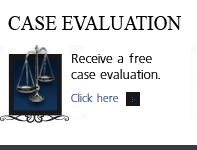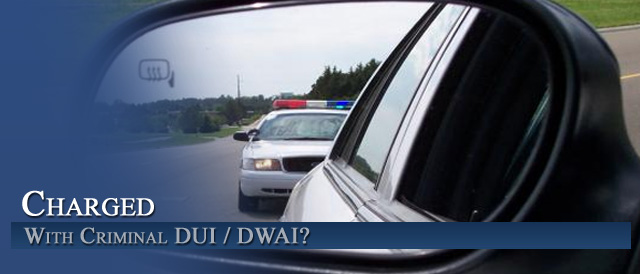
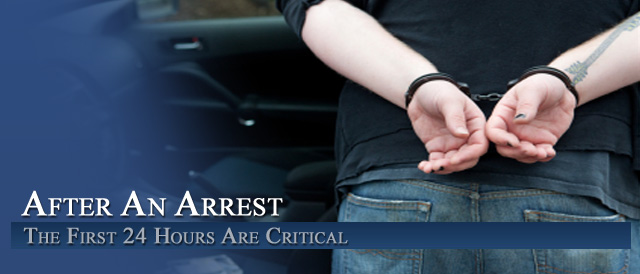
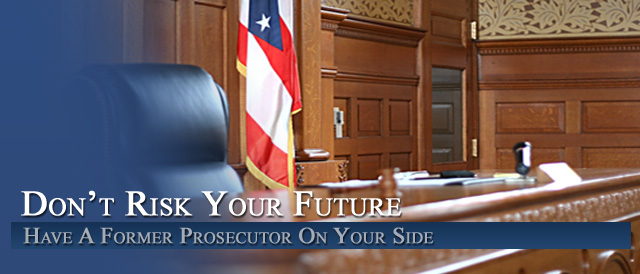
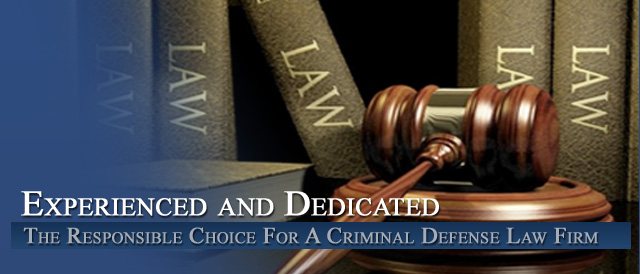
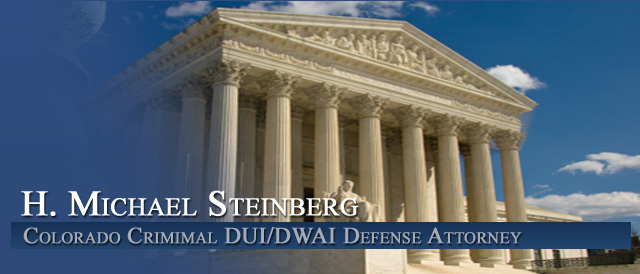
The Colorado Affirmative Defense Of Intervening – Superseding Cause In Vehicular Assault – Vehicular Homicide Cases 18-3-205, 18-3-106
By H. Michael Steinberg – Colorado DUI – DWAI – DUID Vehicular Assault – Homicide Criminal Defense Lawyer – Email the Author at [email protected]
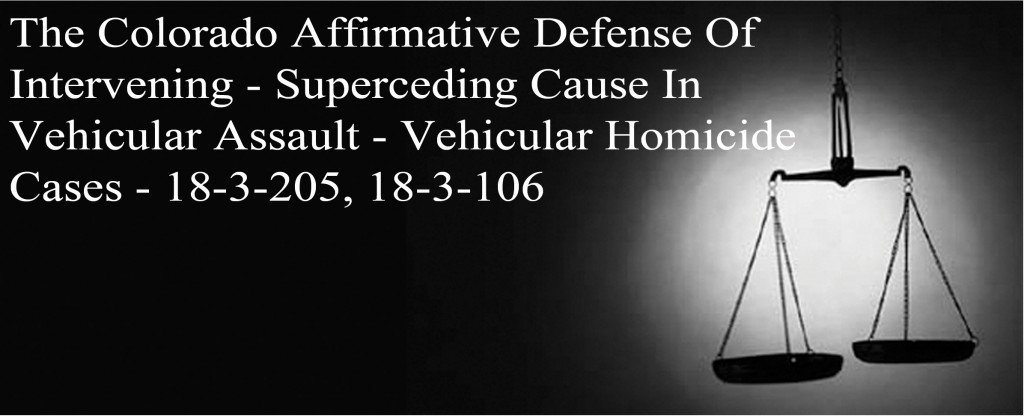 The Colorado Affirmative Defense Of Intervening – Superseding Cause In Vehicular Assault – Vehicular Homicide Cases 18-3-205, 18-3-106 – The possibility of a Colorado DUI escalating to the much more serious charge of Vehicular Assault and Vehicular Homicide is much greater than you might think. Accidents that occur when a driver is intoxicated or high are very common and injuries and possibly death can follow closely as all car accidents can be dangerous to everyone involved.
The Colorado Affirmative Defense Of Intervening – Superseding Cause In Vehicular Assault – Vehicular Homicide Cases 18-3-205, 18-3-106 – The possibility of a Colorado DUI escalating to the much more serious charge of Vehicular Assault and Vehicular Homicide is much greater than you might think. Accidents that occur when a driver is intoxicated or high are very common and injuries and possibly death can follow closely as all car accidents can be dangerous to everyone involved.
The Colorado crimes of Vehicular Assault – 18-3-205 and Vehicular Homicide 18-3-106 are difficult to defend based on the lighter burden of proof on the prosecutor as compared to other types of Colorado felonies. If alcohol or drugs are involved in the commission of these crimes – both laws hold the accused to an element of proof known as strict liability. Strict Liability -means that – unlike most other crimes, these two offenses do NOT require the prosecution to prove the usually essential element of the mental state of the person allegedly committing the crime. [I have written another article on strict liability – (please follow this LINK ) ]
Strict liability in criminal law nullifies having to know the intent of the actor, and makes certain acts criminal regardless of whether there was intent on the part of the offender. A good example is a parking citation. Here a prosecutor does not need to prove that the defendant ever intended to park in the wrong place, it only matters that he did.
Here are the relevant sections of each law addressed in this article:
The Colorado Crime of Vehicular Assault (18-3-205)
(1) (a) If a person operates or drives a motor vehicle in a reckless manner, and this conduct is the proximate cause of serious bodily injury to another, such person commits vehicular assault.
(b) (I) If a person operates or drives a motor vehicle while under the influence of alcohol or one or more drugs, or a combination of both alcohol and one or more drugs, and this conduct is the proximate cause of a serious bodily injury to another, such person commits vehicular assault. This is a strict liability crime.
The Colorado Crime of Vehicular Homicide (18-3-106)
(1) (a) If a person operates or drives a motor vehicle in a reckless manner, and such conduct is the proximate cause of the death of another, such person commits vehicular homicide.
(b) (I) If a person operates or drives a motor vehicle while under the influence of alcohol or one or more drugs, or a combination of both alcohol and one or more drugs, and such conduct is the proximate cause of the death of another, such person commits Vehicular homicide. This is a strict liability crime.
The statute does not require evidence that it was the intoxication that affected the driver’s operation in a manner that resulted in a collision. The clear intent of the legislature in enacting these laws in 1977 was to punish and thereby to deter the conduct of voluntarily driving while intoxicated.
This Article Explores Questions And Answers About The Affirmative Defense of Intervening – Supervening Cause
Because of the doctrine of strict liability – there are few viable defenses to the charge of Vehicular Assault- Homicide. However one somewhat complex defense involves the affirmative defense of Intervening – Supervening Cause
What Does Cause Mean?
Cause is something that precedes and brings about an effect or a result. It is a reason for an action or a condition. It is the agent that brings something about. Cause is that which in some manner is accountable for a condition that brings about an effect or that produces a cause for the resultant action or state.
The criminal courts often use civil law concepts of “simple negligence” and “gross negligence,” and on the concept of foreseeability. to instruct criminal juries in these case.
In civil law – the injured party must prove that the other person brought about the alleged harm because a defendant’s liability is contingent upon the connection between his or her conduct and the injury to the plaintiff. A plaintiff must prove that his or her injury would not have occurred but for the defendant’s negligent or intentional conduct.
The Colorado Affirmative Defense Of Intervening – Superseding Cause In Vehicular Assault – Vehicular Homicide Cases 18-3-205, 18-3-106 – Actual, Concurrent, and Intervening Causes
Actual Causes:
An actual cause is an event “directly responsible” for an injury. It is the immediate cause of the injury. It is the cause that came right before the injury, with no intermediate causes. Actual causes and immediate causes of an injury may be the same.
Concurrent Causes:
Concurrent causes are those events that occur “simultaneously” to produce a given result. These causes contemporaneous and either event alone may bring about the effect that occurs. If one person lethally stabs another person who is simultaneously shot by a third person also in lethal fashion, either act alone could cause the person’s injury.
Intervening Causes:
An intervening cause is a cause that interrupts the normal flow of events between the actual wrong and the injury. It happens – if at all – between an expected sequence of occurrences and it must produce an unanticipated result.
Superseding – Intervening Cause
A Superseding – Intervening cause is a cause that totally supersedes the original wrongful act or omission.
An Example: An intoxicated cabdriver transports a person in a cab with faulty brakes. An accident occurs, which is a direct result of the intoxication rather than the faulty brakes. The injury resulting to the passenger is the direct result of the driver’s condition. Here the intervening cause breaks the causal connection between the original wrong of the faulty brakes and the injury.
The Legal Doctrine of Proximate, Unforeseeable, and Remote Cause
A proximate cause of an injury is the act or omission without which the harm would not have occurred. An unforeseeable cause is one that unexpectedly and unpredictably results from the proximate cause.
Legal or Proximate Causation In Colorado Criminal Cases
The proximate cause of an injury occurs when, in the natural and continued sequence, unbroken by any supervening – intervening cause, a defendant causes the claimed injury, and had it not been for the defendant’s actions, the injury would not have occurred.
Foreseeability then, is the key to understanding proximate cause. It is a critical concept to the impact of attacking proximate cause as a defense.
How Does Causation Work In Criminal Cases?
Having first looked at the civil concepts of causation – we now turn to criminal causation. Criminal causation is properly determined by employing a multi-part test. Prosecutors must prove that the defendant’s conduct is also the “legal” or “proximate” cause of the criminal result. The prosecution must prove that the defendant’s conduct was the cause-in-fact of the result.
Conduct is the cause of a result when … it is an antecedent but for which the result in question would not have occurred.” Model Penal Code �2.03(1)(a) (2000).
Another way of explaining this concept is to view causation is met when a defendant’s conduct is a “substantial factor” in bringing about the result in question.
However a “but for” relationship between conduct and result will not establish criminal causation. Even if there is a ‘but for’ relationship exists, a defendant may defend a case and escape criminal responsibility IF the harmful result caused is so remote or accidental in its manner of occurrence as to make it unjust to hold the accused liable the crimes charged.
Returning To The Concepts of Remoteness and Foreseeability of Result
If proximate cause in the criminal law is the not-so-complex principle that persons normally should be deemed responsible for the natural and probable consequences of their acts – requiring the prosecution to PROVE the causal relationship between the defendant’s conduct and the result provides a defendant with an opportunity ot attack the roots of that proof.
Summary – For causation to be proven, the prosecutor must establish:
(1) that the result is not too remote or accidental in its manner or occurrence to have a just bearing on the actor’s liability or on the gravity of the offense; and
(2) that the relationship between the conduct and the result satisfies any additional causal requirements imposed by the Model Penal Code or by the law defining the offense
To PROVE Vehicular Assault – or Vehicular Homicide in Colorado – the injury must be the natural and probable consequence of the unlawful act, and not the result of an independent intervening cause in which the accused does not participate, and which he could not foresee.
If the act of the accused was NOT the proximate cause of the injury for which the defendant is being prosecuted, and another cause intervened, which the defendant was in no way connected, and “but for” which the injury would not have occurred, this can be argued to be a supervening cause and would constitute an affirmative defense to the charge of Vehicular Assault or Vehicular Homicide.
The Issue Is Related To “Remoteness”
Remoteness addresses the concept of whether a physical causal connection is present but is too attenuated to be relied upon. In the area of civil law – a defendant “is absolved of liability for an injury to a victim if there has been an unforeseeable independent intervening act or cause, because that act “destroys the causal connection between the defendant’s act and the victim’s injury and, therefore, becomes the cause of the victim’s injury.”
An intervening act WILL BREAK THE CAUSE CHAIN UNLESS IT WAS FORSEEABLE.
A 2013 Colorado Case – The People of the State of Colorado v. Smoots – Explains The Affirmative Defense Of Intervening- Superseding Cause Law in Colorado
The Prosecution’s Burden Of Proof At Trial – Strict Liability
The Colorado Court of Appeals Addresses the above concepts and doctrines in the context of an actual appeal:
The prosecution’s burden in proving vehicular assault / DUI is to establish that the defendant operated or drove a motor vehicle while under the influence of alcohol . . . and this conduct was the proximate cause of a serious bodily injury to another. � 18-3-205(1)(b)(I), C.R.S.
As noted above vehicular assault is a strict liability crime, the prosecution’s burden is to prove that the defendant voluntarily drove while intoxicated and that his driving resulted in the victim’s serious bodily injury. Fault – in the traditional criminal – legal sense – is not relevant in determining whether an intoxicated driver causes an accident resulting in serious bodily injury to another.
Garner Court Addresses – Independent Intervening Cause Affirmative Defense – Gross Negligence
According to the 2013 Garner case – an intervening cause defense is treated as an affirmative defense for the purpose of determining the amount of evidence necessary to submit the defense to the jury. A defendant is entitled to an affirmative defense instruction if the defendant presents “some credible evidence” on the issue addressed in the instruction.
Actions qualify as intervening causes if they are unforeseeable. BUT the mere negligence of another is foreseeable and does NOT constitute an intervening cause. On the other hand GROSS negligence . . . is unforeseeable behavior that may serve as an intervening cause.”
Gross negligence is defined under Colorado law as “abnormal human behavior that constitutes an extreme departure from the ordinary standard of care.”
The Garner Case Facts – Garner was traveling in the left lane of traffic, he swerved into the right lane in an apparent attempt to avoid some children in the road – but one of those children was struck and killed when Garner tried to avoid the other children. Garner argued that it was the victim, not the defendant, who walked into the wrong lane prior to the accident.
An independent intervening act rising to the level of gross negligence will destroy the causal connection between the defendant’s act and the victims’ injury.
The Garner Court held that – even in the light of the victim’s actions – those actions would not constitute abnormal human behavior sufficient for a finding of gross negligence. In a comparison case Colorado court’s have held that a driver’s decision to turn in front of an approaching car was negligent, and a driving error, but not abnormal human behavior.
An independent intervening cause is an act of an independent person or entity that destroys the causal connection between the defendant’s act and the victim’s injury and thereby becomes the cause of the victim’s injury.
To qualify as an independent intervening cause, an event must be unforeseeable and one in which the accused does not participate. Simple negligence is foreseeable, and does NOT constitute an independent intervening cause. On the other hand gross negligence is unforeseeable behavior that may serve as an independent intervening cause.
The Trial Judge Decides Whether An Affirmative Defense Will Reach The Jury
To assert an affirmative defense – the defendant must present some credible evidence to support that defense. The trial judge makes the threshold determination of whether the intervening cause defense can be supported by the evidence.
Summary – Definition Of Proximate Cause
“Proximate cause” means a cause which in the natural and probable sequence produced the claimed injury. It is a cause without which the injury would not have been sustained. If more than one act or failure to act contributed to the claimed injury, then each act or failure to act may have been a “proximate cause” of the injury. A proximate cause does not have to be the only cause or the last or nearest cause. It is sufficient if the natural and probable way that some act or failure to act caused some or all of the injury.
One’s conduct is not a “proximate cause” of another’s injuries, however, if, in order to bring about such injuries, it was necessary that his or her conduct combine with or join with an “intervening cause” which also contributed to the cause of the injuries.
Summary – Independent Intervening Cause
An “intervening cause” is a cause which a reasonably careful person under the same or similar circumstances would not have… reasonably foreseen. A “simple act of negligence” by another person cannot constitute an “intervening cause.” Only “gross negligence,” which is unforeseeable, can be considered an “intervening cause.”
The Colorado Affirmative Defense Of Intervening – Superseding Cause In Vehicular Assault – Vehicular Homicide Cases 18-3-205, 18-3-106
ABOUT THE AUTHOR: H. Michael Steinberg – Email The Author – A Denver Colorado Vehicular Assault – Homicide Criminal Defense Lawyer – or call his office at 303-627-7777 during business hours – or call his cell if you cannot wait and need his immediate assistance – 720-220-2277.
If you are charged with A Colorado crime or you have questions about The Colorado Affirmative Defense Of Intervening – Superseding Cause In Vehicular Assault – Vehicular Homicide Cases 18-3-205, 18-3-106, please call our office. The Law Offices of H. Michael Steinberg, in Denver, Colorado, provide criminal defense clients with effective, efficient, intelligent and strong legal advocacy. We can educate you and help you navigate the stressful and complex legal process related to your criminal defense issue.
 H. Michael Steinberg, is a Denver, Colorado criminal defense lawyer with over 40 years of day to day courtroom experience – specializing in Colorado Criminal Law along the Front Range. He will provide you with a free initial case consultation to evaluate your legal issues and to answer your questions with an honest assessment of your options. Remember, it costs NOTHING to discuss your case. Call now for an immediate free phone consultation.
H. Michael Steinberg, is a Denver, Colorado criminal defense lawyer with over 40 years of day to day courtroom experience – specializing in Colorado Criminal Law along the Front Range. He will provide you with a free initial case consultation to evaluate your legal issues and to answer your questions with an honest assessment of your options. Remember, it costs NOTHING to discuss your case. Call now for an immediate free phone consultation.
Helping Clients To Make Informed Decisions In the Defense of Colorado Criminal Cases.
Contact A Lawyer with Three Decades of Experience as a Denver Criminal Attorney at The Steinberg Colorado Criminal Defense Law Firm today.
Colorado Defense Lawyer H. Michael Steinberg provides solid criminal defense for clients throughout the Front Range of Colorado – including the City and County courts of Adams County, Arapahoe County, City and County of Boulder, City and County of Broomfield, City and County of Denver, Douglas County, El Paso County – Colorado Springs, Gilpin County, Jefferson County, Larimer County, and Weld County,…. and all the other cities and counties of Colorado along the I-25 Corridor… on cases involving …The Colorado Affirmative Defense Of Intervening – Superseding Cause In Vehicular Assault – Vehicular Homicide Cases 18-3-205, 18-3-106.
Other Articles of Interest:
- Colorado Vehicular Assault – Vehicular Homicide Charges – What They Mean
- Colorado DUI -DWAI -DUID Penalties And Sentencing 42-4-1307 – Proving Prior Alcohol Driving Convictions In Court
- Colorado DUI Lawyer Answers The Question – What Should I Do If I Am Stopped On Suspicion Of DUI – Refusing The Chemical Test
- Understanding Colorado’s Felony DUI Law – Effective Date – August 5, 2015
- Taking Blood Samples from Colorado Persons Arrested For DUI and Colorado Felonies


